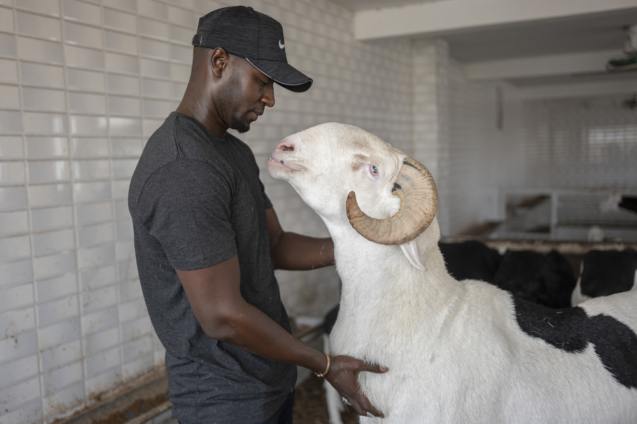“I have slaughtered a ram every year starting from 1976 but this year I can't, I just can't.”
Like many other Muslims in Nigeria, 78-year-old Mallam Kabiru Tudun Wada is not celebrating Eid al-Adha as he normally would because of the cost-of-living crisis.
Muslims around the world traditionally slaughter a ram or another animal on Eid al-Adha, in memory of the prophet Ibrahim's willingness to sacrifice his own son when God ordered him to.
The meat is used to prepare a huge feast for the entire family, while friends and neighbours visit each other and eat the food each family has prepared.
Clerics also recommend that some of the meat is distributed to the poor and needy.
“In years gone by I could afford at least one ram but things have never been tighter,” Mr Wada told the BBC in the city of Kano, the largest city in northern Nigeria, where the vast majority of people are Muslim.
Nigeria is currently experiencing its worst economic crisis in a generation, leading to widespread hardship and anger.
Annual inflation - the average rate at which prices go up - is now over 30%, the highest figure in nearly three decades. The cost of food has risen even more - by 50%.
An average ram now sells for 100,000 naira (£50; $63) which is beyond the reach of many.
Another Nigerian, Mallam Auwal Yakasai, 66, said the only way he could afford to slaughter an animal for Eid this year was to find a friend and share the cost.
“We got a camel so the two of us can slaughter together.
“Things are so tight for many people and for some, an arrangement like this is the only way they can make the sacrifice.”
Muslim cleric Idris Garba Sokoto told the BBC that slaughtering a ram, goat or camel on Eid is one of the most beloved deeds a Muslim can perform for Allah.
“Islam traces the origin of the animal slaughtering on Eid to the prophet Ibrahim, who had a dream and was about to sacrifice his son before God intervened with a ram which he slaughtered instead. Since then it has become a religious practice.”
“For cows and camels, up to seven persons can put money together, buy and slaughter together - Islam permits that,” the cleric said.
Why are there two Eids and what is the difference?
But for many Muslims, and other Nigerians, basic food is their top priority at the moment - not an animal which some consider a luxury.
Shamsu Mohammed, 54, said that even if someone gave him the money to buy an animal, he would be more inclined to buy cheaper food to stock up his home.
“Slaughtering is not compulsory, as Islam says it is for those who have the means. For those who can't afford it, it’s not necessary.”
Ahead of Eid, the ram markets are normally full of people choosing which animal to buy and take home to their family. Normally, people take great pride in choosing the biggest and most impressive animal.
But this year is very different.
Ibrahim Balarabe Wambai makes his living selling rams and his whole year is normally geared around Eid.
He says the market is very different this year.
"Last year I sold 15 rams but this year, I have sold only seven."
The Nigerian government say it is doing all it could to turn the economy around.
Around 15 million poor households are receiving a cash transfer of 25,000 naira ($16; £13) a month but these days that doesn't go very far.
As millions of Nigerian Muslims return from visiting the mosques, the prayer on the lips of many will be that things improve so that by next year, they can not only slaughter an animals but buy new clothes as well.
Latest Stories
-
Tottenham beat Man Utd to win Europa League & end 17-year wait for trophy
4 minutes -
Clear and strong climate policies are antidote to economic uncertainty – UN Climate Chief
28 minutes -
Journalism has become politicised and cheap – KSM laments
34 minutes -
Climate Education reaches differently-abled children at Garden City Special School
36 minutes -
Mahama’s remarks on Cedi vindicate NPP’s economic legacy – Minority
45 minutes -
I lied about having radio experience to get hired – KSM
51 minutes -
NLC direct University Senior Staff Association to call off strike
52 minutes -
Shelters in crisis: Calls grow for gov’t support as caregivers struggle to protect vulnerable children
55 minutes -
Black Sherif set for electrifying performance on COLORSxSTUDIOS on May 22
58 minutes -
Ghana Card blocks prison graduates from National Service – Inmates appeal to Parliament to intervene
1 hour -
Richard Ndignan: United States of Africa – A call for continental rebirth and unity
1 hour -
Hoefman Laboratories boosts maternal care at Ridge Hospital with equipment donation
2 hours -
One in three babies born to HIV-positive mothers at risk of toxoplasmosis, KNUST study reveals
2 hours -
Erroneous to think my role as Torkornoo’s lawyer in injunction application against probe affect optics – Godfred Dame
2 hours -
Suspened CJ Torkornoo is merely barking – Ansa-Asare on injunction to stop removal probe
2 hours

